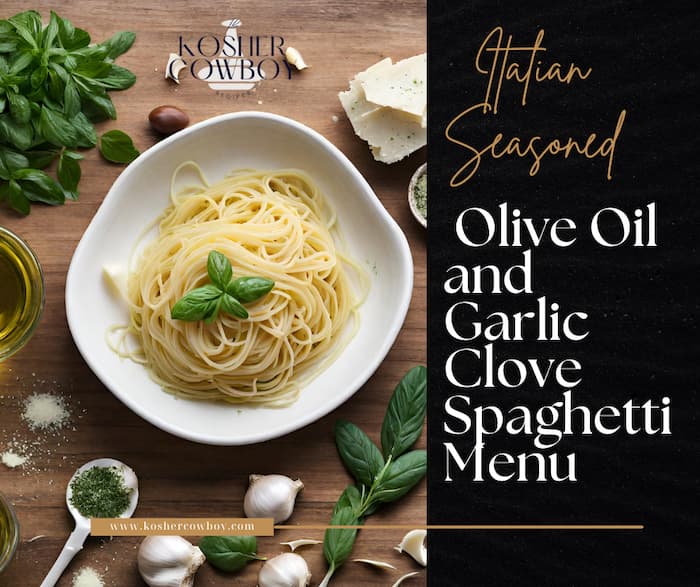Jump to Recipe
Print Recipe
Introduction
Prepare to embark on a culinary journey with Olive Oil and Garlic Clove Spaghetti, a timeless classic that never fails to delight. In this recipe, we’ll explore the simplicity and richness of flavors that come together to create a truly satisfying dish.
History of Olive Oil and Garlic Clove Spaghetti
The origins of this wonderful dish can be traced back to the rustic kitchens of Southern Italy. This beloved pasta dish, with its humble yet flavorful combination of olive oil, garlic, and spaghetti, has stood the test of time and remains a staple in Italian cuisine.
Recipe
To recreate this culinary masterpiece at home, start by cooking spaghetti according to package instructions until al dente. In a skillet, heat olive oil over medium heat and add thinly sliced garlic cloves. Sauté until golden brown and fragrant, then add cooked spaghetti to the skillet. Toss well to coat the pasta with the seasoned olive oil and garlic mixture.
Customization Options
The beauty of this dish lies in its versatility. Feel free to customize this dish with your favorite toppings and sides. Consider adding diced tomatoes, Parmesan cheese, red pepper flakes, sliced olives, or artichoke hearts for an extra burst of flavor.
Serving Suggestions
Serve this dish hot, garnished with grated Parmesan cheese and fresh basil leaves for a touch of freshness. Pair it with a side salad or crusty bread for a complete meal that will satisfy even the pickiest eaters.
Conclusion
In conclusion, Olive Oil and Garlic Clove Spaghetti is a simple yet sophisticated dish that celebrates the beauty of Italian cuisine. Whether enjoyed as a cozy weeknight dinner or a festive gathering with friends and family, this flavorful pasta dish is sure to leave a lasting impression. So grab your apron and get ready to savor the deliciousness of this dish.
Italian Seasoned Olive Oil and Garlic Clove Spaghetti
#wprm-recipe-user-rating-0 .wprm-rating-star.wprm-rating-star-full svg * { fill: #ffce44; }#wprm-recipe-user-rating-0 .wprm-rating-star.wprm-rating-star-33 svg * { fill: url(#wprm-recipe-user-rating-0-33); }#wprm-recipe-user-rating-0 .wprm-rating-star.wprm-rating-star-50 svg * { fill: url(#wprm-recipe-user-rating-0-50); }#wprm-recipe-user-rating-0 .wprm-rating-star.wprm-rating-star-66 svg * { fill: url(#wprm-recipe-user-rating-0-66); }linearGradient#wprm-recipe-user-rating-0-33 stop { stop-color: #ffce44; }linearGradient#wprm-recipe-user-rating-0-50 stop { stop-color: #ffce44; }linearGradient#wprm-recipe-user-rating-0-66 stop { stop-color: #ffce44; }5 from 2 votes
Prep time: 5 minutes minutes Cook time: 15 minutes minutes Total time: 20 minutes minutes Servings: 4
#wprm-toggle-switch-1880397564 input:checked + .wprm-toggle-switch-slider { background-color: #417505 !important; }Cook ModePrevent your screen from going dark
PRINT RECIPE
PIN RECIPE
DESCRIPTION
Indulge in the simplicity and flavor of Italian cuisine with this delightful spaghetti dish. Al dente pasta is coated in a fragrant olive oil infused with garlic slices, dried oregano, basil, and a hint of red pepper flakes for a subtle kick. Topped with Parmesan cheese and fresh basil leaves, this dish is a celebration of traditional Italian flavors that will transport you to the heart of Italy with every bite.
INGREDIENTS 1x2x3x▢ 16 ounces spaghetti▢ ½ cup extra virgin olive oil▢ 6 cloves garlic (thinly sliced)▢ 2 teaspoons dried oregano▢ 2 teaspoons dried basil▢ 1 teaspoon red pepper flakes (optional)▢ Salt and black pepper to taste▢ Grated Parmesan cheese (for serving)▢ Fresh basil leaves (for garnish (optional))
ul.wprm-advanced-list-7893 li:before {background-color: #687796;color: #ffffff;width: 18px;height: 18px;font-size: 14px;line-height: 14px;}INSTRUCTIONS Cook the spaghetti according to package instructions until al dente. Reserve 1 cup of pasta cooking water, then drain the spaghetti and set aside.In a large skillet, heat the olive oil over medium heat. Add the sliced garlic cloves and cook, stirring constantly, until fragrant and golden brown, about 1-2 minutes. Be careful not to burn the garlic.Add the dried oregano, dried basil, and red pepper flakes (if using) to the skillet. Cook for another 1-2 minutes, stirring frequently, to allow the herbs to infuse the oil.Add the cooked spaghetti to the skillet, tossing well to coat the pasta with the seasoned olive oil and garlic. If the pasta seems dry, add some of the reserved pasta cooking water a little at a time until you reach your desired consistency.Season the spaghetti with salt and black pepper to taste, adjusting as needed. Remove the skillet from heat.Serve the Italian Seasoned Olive Oil and Garlic Clove Spaghetti immediately, garnished with grated Parmesan cheese and fresh basil leaves if desired. Enjoy this simple yet flavorful pasta dish with your family or friends!
NUTRITIONCalories: 671kcalCarbohydrates: 87gProtein: 15gFat: 29gSaturated Fat: 4gPolyunsaturated Fat: 4gMonounsaturated Fat: 20gSodium: 17mgPotassium: 307mgFiber: 5gSugar: 3gVitamin A: 169IUVitamin C: 1mgCalcium: 61mgIron: 3mg
DID YOU MAKE THIS RECIPE?Tag me @gokoshercowboy and hashtag it #gokoshercowboy
See more Italian recipes here.
1Share this:Click to print (Opens in new window)Click to share on Pinterest (Opens in new window)Click to share on Facebook (Opens in new window)Click to share on Twitter (Opens in new window)Click to share on WhatsApp (Opens in new window)MoreClick to share on Telegram (Opens in new window)Click to share on Tumblr (Opens in new window)Click to share on Pocket (Opens in new window)Click to share on Reddit (Opens in new window)Click to share on LinkedIn (Opens in new window)Like this:Like Loading…
Related








Ohr HaChaim Yomi – Emor